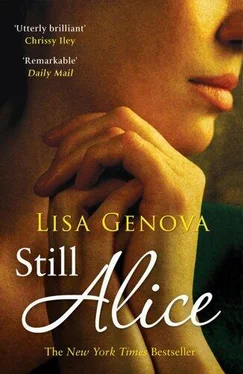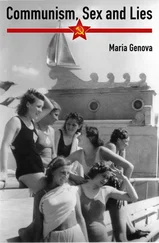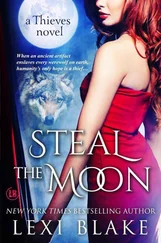"Your dad and I have something important we need to talk to you about, and we wanted to wait until we had all three of you together."
She looked to John. He nodded and squeezed her hand.
"I've been experiencing some difficulties with my memory for some time now, and in January, I was diagnosed with early-onset Alzheimer's disease."
The clock on the fireplace mantel ticked loudly, like someone had turned its volume up, the way it sounded when no one else was in the house. Tom sat frozen with a forkful of frittata midway between his plate and mouth. She should have waited until he'd finished eating his brunch.
"Are they sure it's Alzheimer's? Did you get a second opinion?" he asked.
"She had genetic screening. She has the presenilin-1 mutation," said John.
"Is it autosomal dominant?" asked Tom.
"Yes."
He said more to Tom, but only with his eyes.
"What does that mean? Dad, what did you just tell him?" Anna asked.
"It means we have a fifty percent chance of getting Alzheimer's disease," said Tom.
"What about my baby?"
"You're not even pregnant," said Lydia.
"Anna, if you have the mutation, it's the same for your children. Each child you have would have a fifty percent chance of inheriting it, too," said Alice.
"So what do we do? Do we go get tested?" asked Anna.
"You can," said Alice.
"Oh my god, what if I have it? And then my baby could have it," said Anna.
"There'll probably be a cure by the time any of our kids would need it," said Tom.
"But not in time for us, is that what you're saying? So my kids will be fine, but I'll be a mindless zombie?"
"Anna, that's enough!" John snapped.
His jaw clenched, and his face flushed. A decade ago, he would've sent Anna to her room. Instead, he gave Alice's hand a hard squeeze and jiggled his leg. In so many ways, he'd become powerless.
"Sorry," said Anna.
"It's very likely that there'll be a preventative treatment by the time you're my age. That's one of the reasons to know if you have the mutation. If you do, you might be able to go on a medication well before you're symptomatic and, hopefully, you never will be," said Alice.
"Mom, what kind of treatment do they have now, for you?" asked Lydia.
"Well, they have me on antioxidant vitamins and aspirin, a statin, and two neurotransmitter drugs."
"Are those going to keep the Alzheimer's from getting any worse?" asked Lydia.
"Maybe, for a little while, they don't really know for sure."
"What about what's in clinical trials?" asked Tom.
"I'm looking into that now," said John.
John had begun talking to clinicians and scientists in Boston who researched the molecular etiology of Alzheimer's, getting their perspectives on the relative promise of the therapies in the clinical pipeline. John was a cancer cell biologist, not a neuroscientist, but it wasn't a huge leap for him to understand the cast of molecular criminals run amok in another system. They all spoke the same language--receptor binding, phosphorylation, transcriptional regulation, clathrin-coated pits, secretases. Like owning a membership card to the most exclusive club, being from Harvard gave him instant credibility with and access to the most respected thought leaders in Boston's Alzheimer's research community. If a better treatment existed or might exist soon, John would find it for her.
"But Mom, you seem perfectly fine. You must've caught this really early on, I wouldn't even know anything was wrong," said Tom.
"I knew," said Lydia. "Not that she had Alzheimer's, but that something was wrong."
"How?" asked Anna.
"Like sometimes she doesn't make any sense on the phone, and she repeats herself a lot. Or she doesn't remember something I said five minutes ago. And she didn't remember how to make the pudding at Christmas."
"How long have you noticed this?" asked John.
"At least a year now."
Alice couldn't trace it quite that far back herself, but she believed her. And she sensed John's humiliation.
"I have to know if I have this. I want to get tested. Don't you guys want to get tested?" asked Anna.
"I think living with the anxiety of not knowing would be worse for me than knowing, even if I have it," said Tom.
Lydia closed her eyes. Everyone waited. Alice entertained the absurd idea that she had either resumed memorizing her lines or fallen asleep. After an uncomfortable silence, she opened her eyes and took her turn.
"I don't want to know."
Lydia always did things differently.
IT WAS ODDLY QUIET IN William James Hall. The usual chatter of students in the hallways--asking, arguing, joking, complaining, bragging, flirting--was missing. Spring Reading Period typically precipitated the sudden sequestering of students from the campus at large into dormitory rooms and library cubicles, but that didn't begin for another week. Many of the cognitive psychology students were scheduled to spend an entire day observing functional MRI studies in Charlestown. Maybe that was today.
Whatever the reason, Alice relished the opportunity to get a lot of work done without interruption. She had opted not to stop at Jerri's for tea on the way to her office and wished now that she had. She could use the caffeine. She read through the articles in the current Linguistics Journal, she put together this year's version of the final exam for her motivation and emotion class, and she answered all previously neglected emails. All without the phone ringing or a knock on the door.
She was home before she realized that she'd forgotten to go to Jerri's. She still wanted that tea. She walked into the kitchen and put the kettle on the stove. The microwave clock read 4:22 a.m.
She looked out the window. She saw darkness and her reflection in the glass. She was wearing her nightgown.
Hi Mom, The IUI didn't work. I'm not pregnant. I'm not as upset as I thought I'd be (and Charlie seems almost relieved). Let's hope my other test comes back negative as well. Our appointment for that is tomorrow. Tom and I will come over after and let you and Dad know the results. Love,
Anna THE ODDS OF THEM BOTH being negative for the mutation descended from unlikely to remote when they still weren't home an hour after Alice had anticipated their arrival. If they were both negative, it would have been a quick appointment, a "you're both fine," "thank you very much," and out-the-door appointment. Maybe Stephanie was just running late today. Maybe Anna and Tom had sat in the waiting room much longer than Alice had allowed for in her mind.
The odds crashed from remote to infinitesimal when they finally walked through the front door. If they were both negative, they would have just blurted it out or it would have sprung, wild and jubilant, from their facial expressions. Instead, they muscled what they knew beneath the surface as they moved into the living room, stretching out the time of Life Before This Happened as long as possible, the time before they'd have to unleash the hideous information they so obviously held.
They sat side by side on the couch, Tom on the left and Anna on the right, like they had in the backseat of the car when they were kids. Tom was a lefty and liked the window, and Anna didn't mind the middle. They sat closer now than they ever did then, and when Tom reached over and held her hand, she didn't shriek, "Mommm, Tommy's touching me!"
"I don't have the mutation," said Tom.
"But I do," said Anna.
After Tom was born, Alice remembered feeling so blessed, that she had the ideal--one of each. It took twenty-six years for that blessing to deform into a curse. Alice's facade of stoic parental strength crumbled, and she started to cry.
"I'm sorry," she said.
"It's going to be okay, Mom. Like you said, they're going to find a preventative treatment," said Anna.
Читать дальше












